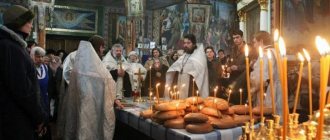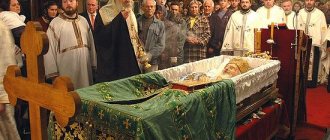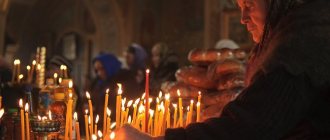Why remember the dead?
The fact is that life continues after death. Moreover, the final fate of a person is decided not after death, but at the second coming of our Lord Jesus Christ, which we are all waiting for. Therefore, before the second coming we can still change this fate. When we are alive, we can do this ourselves by doing good deeds and believing in Christ. Having died, we can no longer influence our own afterlife, but this can be done by people who remember us and have heart problems. The best way to change the posthumous fate of the deceased is prayer for him.
When are the dead remembered? On what days are the dead commemorated? At what time of day can you remember?
The time of day when one can remember the deceased is not regulated by the Church. There are folk traditions that go back to paganism and clearly prescribe how and at what hour to remember the dead, but they have nothing to do with Christian prayer. God lives in space without time, and we can reach heaven at any moment of the day or night. The Church has established special days of remembrance of those who are dear to us and have passed on to another world - the so-called Parental Saturdays. There are several of them a year, and all but one (May 9 - Commemoration of the Deceased Warriors) have a moving date: Meat Saturday (Ecumenical Parental Saturday) March 5, 2016. Saturday of the 2nd week of Lent, March 26, 2016. Saturday of the 3rd week of Lent, April 2, 2016. Saturday of the 4th week of Lent, April 9, 2016. Radonitsa May 10, 2016 May 9 - Commemoration of the departed soldiers Trinity Saturday (Saturday before the Trinity Day). June 18, 2016. Saturday Dimitrievskaya (Saturday before the day of memory of Dmitry Solunsky, which is celebrated on November 8). November 5, 2016. In addition to Parental Saturdays, the deceased are remembered in church at every service - at the proskomedia, part of the Divine Liturgy that precedes it. Before the Liturgy, you can submit notes “of remembrance.” The note contains the name with which the person was baptized, in the genitive case.
How do you remember for 9 days? How do you remember for 40 days? How to remember for six months? How to remember for a year?
The ninth and fortieth days from the day of death are special milestones on the path from earthly life to eternal life. This transition does not occur immediately, but gradually. During this period (until the fortieth day), the deceased person gives an answer to the Lord. This moment is extremely important for the deceased; it is akin to childbirth, the birth of a little person. Therefore, during this period the deceased needs our help. Through prayer, good deeds, changing ourselves for the better in honor and memory of those close to us. For six months, such a church commemoration does not exist. But there will be nothing bad if you remember it for six months, for example, by coming to the temple to pray. An anniversary is a day of remembrance when we, those who loved a person, come together. The Lord commanded us: Where two or three are gathered in My name, there I am in the midst of them (Matthew 18:20). And joint remembrance, when we read a prayer for relatives and friends who are no longer with us, is a bright, resounding testimony to the Lord that the dead are not forgotten, that they are loved.
Is it possible to perform funeral services for suicides? How to remember suicides?
The question of funeral services and church commemoration of suicides is very controversial. The fact is that the sin of suicide is one of the gravest. This is a sign of a person's distrust of God. Each such case must be considered separately, because there are different types of suicides - conscious or unconscious, that is, in a state of severe mental disorder. The question of whether it is possible to have a funeral service and commemorate a baptized person who committed suicide in a church rests entirely with the responsibility of the ruling bishop. If a tragedy happened to one of your loved ones, you need to come to the ruling bishop of the region where the deceased lived and ask permission for a funeral service. The bishop will consider this question and give you an answer.
As for home prayer, you can certainly remember a person who committed suicide. But the most important thing is to do good deeds in his honor and memory.
What can you remember? Can you remember it with vodka? Why are they remembered with pancakes?
Trizny, funeral meals, came to us from time immemorial. But in ancient times they looked different. This was a treat, a feast not for the relatives of the deceased, but for the poor, crippled, orphans, that is, those who need help and would never be able to arrange such a meal for themselves. Unfortunately, over time, the funeral feast turned from a matter of mercy into an ordinary home feast, often with copious amounts of alcohol... Of course, such libations have nothing to do with real Christian commemoration and cannot in any way influence the posthumous fate of the deceased.
Alcohol and the funeral meal
Alcoholic drinks at funerals are not approved by the church. Wine in religious tradition symbolizes the joy of life and is inappropriate when saying goodbye to the deceased. In addition, drunkenness is interpreted as demonic possession, and a person who condones demons cannot ask for forgiveness of the sins of the deceased. Therefore, it is better to place a glass of water and a piece of bread near the portrait of the deceased. You can’t even drink this water and give this bread to animals.
Despite these considerations, there is still a custom of pouring vodka into a glass for the deceased, drinking at least one glass at the funeral for the repose of the soul, not clinking glasses, and accompanying the entire funeral meal with alcohol. Here you can see echoes of ancient and violent pagan funeral feasts, find reasons in established civil traditions and explain the use of alcohol with its antidepressant properties, which, however, are accompanied by harmful side effects.
How to remember the dead in church?
In the temple, all those dead who united themselves with the Church of Christ in the Sacrament of Baptism are remembered. Even if a person for some reason did not go to church during his life, but was baptized, he can and should be remembered. Before the Divine Liturgy, you can submit a note “for proskomedia.” Proskomedia is the part of the Divine Liturgy that precedes it. At the proskomedia, bread and wine are prepared for the future Sacrament of Communion - the transfusion of bread and wine into the Body and Blood of Christ. On it, not only the future Body of Christ (the Lamb is a large prosphora) and the future Blood of Christ for the Sacrament (wine) are prepared, but also a prayer is read for Christians - living or dead. For the Mother of God, the saints and us, ordinary believers, particles are taken out from the prosphora. Pay attention when they give you a small prosphora after Communion - it’s as if “someone picked out a piece” from it. It is the priest who takes out particles from the prosphoras for each name written in the note “for proskomedia.” At the end of the Liturgy, pieces of bread, symbolizing the souls of living or dead Christians, are immersed in a chalice with the Blood of Christ. The priest at this moment reads the prayer “Wash away, Lord, the sins of those remembered here by Thy Blood through the honest prayers of Thy saints.” Also in churches there are special memorial services - requiems. You can submit a separate note for the memorial service. But it is important not only to submit a note, but also to try to be personally present at the service where it will be read. You can find out about the time of this service from the temple servants, to whom a note is given.
Organization of funerals according to Christian traditions
One should not constantly remember the dead. This is how the living disturb them. It is allowed to remember loved ones on one of the days established by the church. You can also read prayers each time the clergy conduct an ecumenical commemoration. It is permissible to do this at home, as well as in the temple. It is recommended to visit the grave of the deceased, but there are some restrictions when holding a memorial dinner. It is then that many Orthodox canons are violated, which harms the souls of the living and the dead.
Funeral events in the temple early in the morning and a memorial service until the evening
Divine services held on memorial days:
- Remembrance is morning prayer; during the service, a special ritual is performed when believers remove small pieces of prosphora, which symbolizes the flesh of Christ;
- Memorial service - held on memorial days, but you can choose another time, but this is possible only by prior arrangement;
- Sorokoust: prayer reading is carried out every day for 40 days, it is obligatory to remove the prosphora and immerse it in the Chalice with the Blood of Christ, it is permissible to perform private (home) commemoration;
- Litiya is another type of funeral service, differing from a memorial service in its shorter duration.
Sorokoust for the repose
Funeral prayers for the deceased: when can you read them?
Prayer is an important part of any worship service. Loved ones should also pronounce sacred words. When a service is held, the priest may not have enough strength to put into the prayer words the feelings that the relatives of the deceased experience. For this reason, everyone who comes should ask for the deceased. Prayer facilitates the transition of the deceased to another world. At this time, the Lord can forgive some of the sins he committed during his lifetime.
They say prayer words on days specially set aside for this - those determined by the Church. Divine services are held then. However, it is allowed to read prayers on other days.
In addition, it is obligatory to pronounce sacred words after the funeral in the cemetery, as well as on the 3rd, 9th, 40th day.
Relatives can read prayers:
- about the deceased – up to 40 days;
- after 40 days;
- on the 9th day after death.
In addition, an akathist is pronounced: for 40 days before the anniversary of death.
Akathist for the departed
Visit to the grave at the cemetery until 14.00
It is necessary to attend the service, preferably going straight to its beginning. After this you can go to the cemetery. Moreover, priests recommend visiting the churchyard before lunch. As a last resort, you should arrive at the grave before sunset. This cannot be done at night. Moreover, this rule is followed not only by Orthodox believers. It is obligatory for Muslims and Jews to observe it. This is a common tradition that unites all religions.
Visit to the cemetery
Funeral dinner
Funerals are held on any day, except religious holidays. It is necessary to consult with a clergyman to find out how the transfer of the day of remembrance is carried out in this case. Lunch should not be sumptuous, and food should not be plentiful. Today it is not customary to drink alcohol at funerals. You should pray for the deceased. Those who cannot do this for various reasons should remember the good things. As a last resort, you can only think about the deceased.
The funeral table should have kutia, the main dishes that are usually prepared for this occasion: pancakes, pies. Moreover, a funeral dinner cannot be held in a cemetery. Everything that remains after the meal is distributed to the needy and poor. The wake for the first anniversary should be even more modest.
If immediately after the funeral relatives and friends gather for dinner, then after 1 year the deceased is remembered in a narrow circle - relatives.
Guests at the wake
Distributing alms and assistance to those in need
Almsgiving is a way of remembering the deceased: on his behalf, money is distributed to the needy, but more often - food and things. Such acts help the soul of the deceased - thanks to them, some sins are forgiven. When alms are given, you can ask the person receiving it to pray for the deceased. This is one of the ways to help his soul overcome the ordeal. Many people believe that the deceased needs earthly food and alcohol, so they put a glass and bread in front of the photograph when they are going to remember him. This is a misconception, because the only need of the ethereal shell is prayer and good deeds performed on behalf of the deceased.
Help those in need
How to remember the newly deceased?
From the first day of a person’s repose, the Psalter is read over his body. If the deceased is a priest, then the Gospel is read. The Psalter must continue to be read even after the funeral - until the fortieth day. The newly deceased is also remembered at the funeral service. The funeral service is supposed to take place on the third day after death, and it is important that it is carried out not in absentia, but over the body of the deceased. The fact is that all those who loved the person come to the funeral service, and their prayer is special, conciliar. You can also remember the newly deceased with a sacrifice. For example, distribute his good, high-quality things to those in need - clothes, household items. This can be done from the first day after a person’s death.
Other beliefs associated with funerals
At the funeral table they say only good things about the deceased. This rule is thousands of years old, and people still try to follow it.
Before the funeral meal, you should definitely wash your hands thoroughly, meaning not only physical, but also energetic cleansing of the negative energy that accompanies the burial site.
A wake is not a place for strong emotions. For centuries, the prevailing signs say: whoever cries a lot drowns the deceased in tears. Whoever starts laughing will then shed a lot of tears
The complex of funeral superstitions forms a kind of cultural code, so that funeral services with kutya and spoons, drinks and water for the deceased can be immediately identified as domestic.
How to remember animals?
It is not customary to remember animals in Christianity. The teaching of the Church says that eternal life is prepared only for man, since only man has the soul for which we pray.
The man didn’t die, he just left... He left everything in the house as it was... He just doesn’t see or hear, He no longer has earthly bread... He just became different from people, He opened another... astral path... Where is another life ... another wisdom Where is the other salt... the other essence... There will be a bookmark in the book On the page about his love... On the table there is a note... very briefly: “Remember, but only... don’t call..." The man didn’t die... he just went out and opened air bridges Between the shores of a past life And another invisible line... Elena Gromtseva.
Should pregnant women go to funerals?
Funerals and wakes, as their continuation, should not be attended by pregnant women. It is difficult to find a rational and obvious explanation for this, but the inappropriateness of the presence of a woman carrying a child in an atmosphere of grief, sadness and mourning is clearly felt intuitively. The farewell ceremony may require the obligatory presence of the pregnant woman, but staying in the cemetery, attending the burial and participating in the funeral meal can and should even be refused.
The Church does not impose such prohibitions, but, on the other hand, it does not oblige pregnant women to attend funerals and wakes. Instead of a cemetery and a meal, you can visit a temple, leave a memorial note, light a candle in memory of the deceased.











